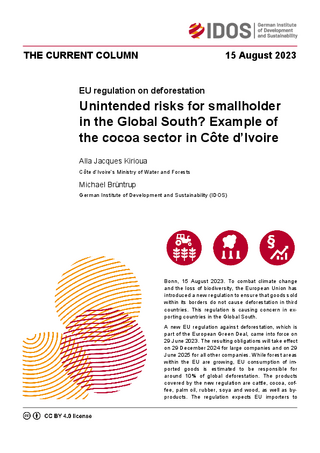EU regulation on deforestation
Unintended risks for smallholder in the Global South? Example of the cocoa sector in Côte d’Ivoire
Kirioua, Alla Jacques / Michael BrüntrupThe Current Column (2023)
Bonn: German Institute of Development and Sustainability (IDOS), The Current Column of 15 August 2023
Bonn, 15 August 2023. To combat climate change and the loss of biodiversity, the European Union has introduced a new regulation to ensure that goods sold within its borders do not cause deforestation in third countries. This regulation is causing concern in exporting countries in the Global South.
A new EU regulation against deforestation, which is part of the European Green Deal, came into force on 29 June 2023. The resulting obligations will take effect on 29 December 2024 for large companies and on 29 June 2025 for all other companies. While forest areas within the EU are growing, EU consumption of imported goods is estimated to be responsible for around 10% of global deforestation. The products covered by the new regulation are cattle, cocoa, coffee, palm oil, rubber, soya and wood, as well as by-products. The regulation expects EU importers to prove that the imported products are not from areas deforested after the cut-off date, 31 December 2020. Thus, each product batch has to be retraceable to the plot of production, and that plot has to have been proven to be deforested before the cut-off date.
The real impact on the EU's “partners” in the Global South is not only causing concern in exporting countries, but there are even risk from unintended negative impacts which have to be weighed against the intended positive ones, as the example of cocoa in Côte d'Ivoire shows.
In Côte d'Ivoire, cocoa farming is a major economic and social sector. This industry supports almost one million cocoa farmers and, together with families and other supply chain actors, more than 8 million people. With a production of about 2.4 million tons in 2022, it accounts for 15% of Côte d’Ivoire’s gross domestic product and 40% of its exports. The country produces 40% of the world's cocoa, and exports 59% of its output to the EU.
At the same time, Côte d’Ivoire’s forests continue to experience a rapid decline in the area. 9 million hectares have been lost since 1960 and forests cover currently 9% of the country’s territory. Agriculture has caused 62% of deforestation, led by cocoa with 38%. The government’s objective is to reverse the trend and achieve at least 20% national forest area by 2045. To reach this objective, a National Forest Preservation, Rehabilitation and Extension Strategy is being implemented. Seen in this light, the objectives of the EU are in line with the country's own ambitions.
There are doubts, however, whether the EU regulation can really make a change for the better, or whether it has the potential to make things worse. The EU regulation requires investments by government, private sectors and farmers. The Government needs to invest in a system to identify plots according to their deforestation status, issuing identification codes to farmers. The private sector needs to establish systems to retrace each product to its origin, and organise verification. Farmers have to prove the origin of their cocoa from different plots and may have to invest in packaging and batch and bag identification. In addition, it is not clear how traditional practices such as shifting cultivation (fallows with secondary forests) will be accounted for and which adaptations will be necessary.
Whether such important investments and adjustments can be made in the short time until the regulation entry date is more than uncertain. Significant efforts and funds have been devoted in recent years on various private, public and public-private initiatives such as the Cocoa and Forest Initiative, but the results have been relatively modest. The forecast public investment needs for a sustainable cocoa sector for the period 2020-2028 amount to 1.9 billion dollars.
For all these reasons, Côte d’Ivoire risks seeing the amount of cocoa exported into the EU dropping considerably. This could increase the cocoa prices in the EU, but these will only benefit actors of those supply chains able to provide the requested evidence. But, the additional costs for adaptation to the new requirements throughout the value chain will eat up a good part of these prices, therefore hardly benefiting farmers. Those farmers dropping out will be forced to sell cocoa to other, less regulated markets in lower income countries with lower prices. Or they will have to switch to other products, with uncertain effects on deforestation.
Through its new regulation, the EU will be able to claim a neutral balance sheet in terms of deforestation. It risks, however, to not necessarily stop deforestation and could even accelerate it. If even a middle-income country such as Côte d'Ivoire is struggling with the challenges of this regulation, how much more will poorer countries and its farmers be challenged and possibly excluded?
The EU's willingness to take concrete initiatives to accelerate sustainable change is to be applauded. But the EU should avoid imposing a vision of sustainability with unrealistic or incomplete measures, instead ensure that these initiatives are viable, sustainable and positive for everyone. In addition, systematic accompanying investments should be made by EU to support those trying to achieve the newly set standards.. Further supply chain regulations in the Global North should be carefully scrutinised for the same reasons.
Alla Jacques Kirioua is Deputy Director of forest cadastre and cartography at Côte d’Ivoire’s Ministry of Water and Forests. With a background in forestry, geography and environmental management, his work areas are agroforestry, reforestation, spatial monitoring of forests and forests landscape restoration.
Michael Brüntrup is a Senior Researcher at the German Institute of Development and Sustainability (IDOS). As an Agricultural Scientist by training, he conducts research and projects in the fields of Agriculture and Food Security with a focus on Sub-Saharan Africa.


